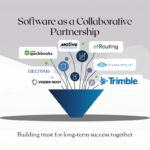The 2024 National Tank Truck Carriers (NTTC) Annual Conference brought together industry leaders to discuss the pressing issues and emerging trends in the liquid transportation sector.
Key Topics Covered:
- Electronic Documentation and Bill of Lading: The conference emphasized the importance of digital solutions in streamlining paperwork and enhancing efficiency. The primary goal of implementing electronic bill of lading (BOL) systems is to create a centralized database accessible to first responders during emergencies. This database would provide vital information about the freight on the truck. While hazardous materials still require a physical paper copy of the BOL in the truck, the industry is exploring ways to improve visibility for first responders through electronic documentation. The adoption of electronic BOL systems aims to balance the need for physical documentation for hazardous materials with the benefits of digital solutions in enhancing safety and efficiency in transportation.
- Trailer Contamination from Prior Loads: Attendees addressed the critical issue of cargo contamination caused by residual materials from previous loads. They shared best practices for tank cleaning and inspection, emphasizing the importance of maintaining the integrity of liquid products during transportation.
- Cargo Tank and Storage Tank Overfilling: The conference tackled the risks associated with overfilling tanks, both during loading and unloading processes. Experts provided insights on advanced monitoring systems and safety protocols to prevent spills and ensure compliance with regulations.
- Accidental Mixing of Products: The inadvertent mixing of different liquid products can lead to costly losses and potential safety hazards. Attendees explored strategies to minimize the risk of product mixing, including the use of innovative compartmentalized tank designs and rigorous loading and unloading procedures.
Industry Outlook:
Despite the challenges faced by the general truckload freight market, the bulk/tank truck industry demonstrated resilience in 2024. Carriers reported better driver retention rates, more stable pricing, and consistent schedules compared to other sectors. However, the conference also highlighted the need for continued adaptation to meet the evolving demands of the market.
One notable presentation focused on the viability of electric trucks in the tank truck industry. The study concluded that current limitations in weight capacity, range, and charging infrastructure make electric heavy-duty trucks not yet suitable for widespread adoption in the liquid transportation sector.
Looking Ahead:
As we move through 2024, the conference provided valuable insights into the expected market conditions. While macroeconomic growth is projected to slow down, the truck freight market is likely to stabilize and potentially experience a slight uptick. However, carriers are advised to remain cautious, as market pressures may lead to further consolidation and exits throughout the year.
The timing of a market turnaround will largely depend on the number of carriers leaving the industry in early 2024 and the potential improvement in freight demand during the spring season.
Optimizing Operations with True Liquid:
Amidst discussions of industry challenges and opportunities, TrueLiquid’s team felt pride in their efforts to build a comprehensive solution for liquid transportation management. Our cloud-based TMS (Transportation Management System) is designed to address the industry’s unique needs, offering a seamless way to optimize operations and ensure the efficient flow of liquid cargo.
With current and planned features like intelligent commodity management, dynamic route optimization, load forecasting, and best buy sourcing, TrueLiquid empowers carriers to tackle the unique complexities of liquid freight. The system’s intuitive design and automated upgrades make it an ideal choice for fleets looking to streamline their operations and future-proof their business.
As the liquid transportation industry continues to evolve, the 2024 NTTC Annual Conference provided a platform for shared knowledge and collaboration. By staying informed about the latest trends, challenges, and solutions, carriers can position themselves for success in the years ahead.



